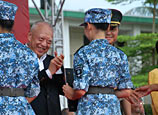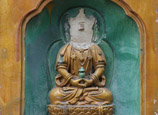
UNITED NATIONS, July 31 (Xinhua) -- UN Secretary-General Ban Ki- moon and European Union's foreign policy chief Catherine Ashton on Wednesday stressed "the importance of an inclusive political process" in Egypt, where protests and violence have been going on over the past weeks.
Ban spoke with Ashton following her second visit this month to Egypt, where she met with the country's deposed President Mohamed Morsi on Monday, UN spokesman Martin Nesirky said in a note to the press here.
Ban and Ashton "stressed the importance of an inclusive political process" which would take into account views and aspirations of all parts of Egypt's political spectrum, said the spokesman.
The UN chief shared with Ashton "his deep concern about the direction of the transition in Egypt and particularly about the continued detentions in the country," Nesirky said.
"It was welcome and important" that Ashton had seen Morsi, Ban said, reiterating his appeal to release Morsi and senior Muslim Brotherhood officials, according to the spokesman.
Morsi, deposed on July 3 after massive protests against his rule, is being detained at an undisclosed location. He has not been seen publicly since his ouster. On Friday, a top Egyptian court ordered the detention of Morsi for 15 days for investigations over charges of spying and jailbreak during the 2011 unrest that toppled then President Hosni Mubarak.
Ashton, who traveled to Cairo late Sunday, held talks Monday with senior Egyptian officials including interim President Adli Mansour, interim Vice President for International Affairs Mohamed ElBaradei and Defense Minister Abdel Fatah al-Sisi. She also met representatives of the pro-Morsi coalition.
Meanwhile, Ban and Ashton also discussed the Middle East peace process, the spokesman said. "The secretary-general expressed his hope for the success of the current efforts to bring the Israelis and Palestinians together at the negotiating table, and the UN's readiness to work with the EU and other partners in the Quartet to support the process."
The Quartet, which comprises the UN, the European Union, Russia and the United States, commits itself to the Middle East peace on the basis of the widely backed two-State solution, which means a secure State of Israel to live in peace with an independent State of Palestine.
In a statement issued here Tuesday, the Quartet welcomed the announcement by U.S. Secretary of State John Kerry that Israelis and Palestinians resumed talks in Washington on Monday.
Peace talks between the two parties have gone off and on during the past two decades. Israeli Prime Minister Benjamin Netanyahu and Palestinian President Mahmoud Abbas last talked to each other for about 16 hours in a period of three weeks in September 2010, under the mediation of the Obama administration. They left the negotiating table due to Israel's refusal to extend a ban on settlement building in the West Bank.
















 Gun fight between police, drug dealers in China's Chengdu
Gun fight between police, drug dealers in China's Chengdu


![]()
